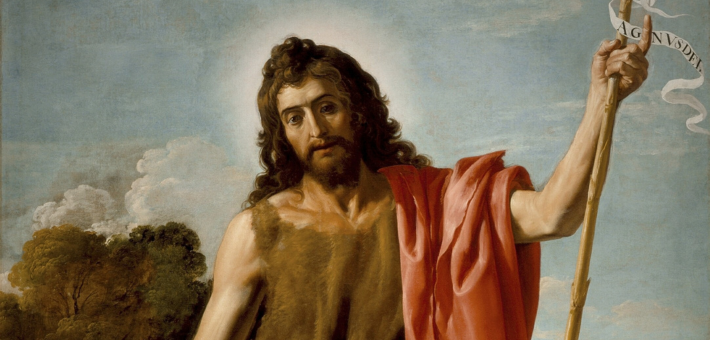Commentary on Isaiah 61:1-4, 8-11
“Today this scripture has been fulfilled in your hearing” (Luke 4:21). So declares Jesus at the beginning of his public ministry, after reading the opening verses of this lection (Isaiah 61:1–2; Luke 4:18–19) before a crowd of people gathered in the synagogue at Nazareth.
The speaker of Isaiah 61:1–4 has been anointed for a mission of radical proclamation. Their commission is, first and foremost, to bring good news to the poor (61:1). In the ancient Greek (Septuagint) translation of Isaiah quoted in Luke’s Gospel, the phrase “to bring good news,” in Hebrew lĕbaśśēr, is rendered by the Greek word euangelisasthai, from the same root as euangelion, “gospel.” Combined with the fact that Jesus quotes this passage from Isaiah in the first sermon Luke attributes to Jesus, this verbal correspondence suggests that these verses from Isaiah have something to teach us about the character of the Christian gospel itself.
The content of the good news the prophet has been charged to deliver is summarized in the words “joy,” “liberation,” and “release.” Their effects are characterized as healing and comfort for those who are brokenhearted and sorrowing (Isaiah 61:1–2).
Exuberant imagery of reversal and exchange casts a vision of transformation. But the changes envisioned are not internal only. That is, though they encompass emotion and spirituality, they are not limited to these domains. Rather, the envisioned transformation is grounded in material realities. The prophet’s audience is “oppressed ones” (ănāwîm), a word that can also be translated “lowly ones” or “ones who are poor.” This latter translation corresponds to the Septuagint rendering ptochois, meaning “poor,” “oppressed,” or “powerless,” which is quoted in Luke 4:18.
While it might be tempting to regard this term as designating those who are humble or meek (see also the reference to those who are “poor in spirit” in Matthew 5:3), in modern parlance humility is a voluntary condition. The Hebrew term ănāwîm here connotes a status that has not been chosen. It refers to those on whom low social status has been imposed and from whom economic advantages have been systematically withheld.
The social and material circumstances the prophet addresses come into sharper focus as the details of the commission unfold. In addition to joy and healing, the mission declares liberation of captives and release of prisoners. In the context of ancient Yehud, the captives and prisoners may have included Judeans still living in exile, those subjected to debt slavery, or even political prisoners. The “opening” or release the prophet here announces is thus not metaphorical. It may rather be seen as an example of the literary device of synecdoche, or part for the whole. These examples of healing and liberation betoken a wider set of reversals that will reverberate across every sector of society, bringing justice in the place of injustice, vindication in the place of oppression, and joy in the place of sorrow (Isaiah 61:1–3, 8).
Yet the passage does contain metaphor. Those who have been mourning will be called “oaks of righteousness” and “the planting of the LORD” (61:4). These organic metaphors display God’s power to elevate the lowly. God will raise up those who are bowed down and strengthen those who are weak. Their roots will give them staying power. Their elevated status will owe not to exploitation that keeps others down but to a quality of righteousness that lifts others up with them.
Indeed, they will build up ruined cities and turn wasted lands into thriving, fertile places (61:4–5). This imagery enfolds landscape and built environment into the promise of social renewal. In the lection’s final verse, a set of similes locates in the land’s capacity to nourish and bring forth new growth an analogy for God’s own power and will to bring about justice and praise (61:11). The people who are God’s planting will bear the fruit of righteousness.
A further set of similes and metaphors peppers the passage: that of clothing. Those who are sorrowing will trade their ashes for a radiant headdress and will receive a glorious mantle (Isaiah 61:3). Headdress and covering are introduced again in verse 10. The speaker praises God for clothing them in righteousness and salvation. The headdress they now wear symbolizes simultaneously the roles of priest (yĕkahēn) and bridegroom (61:10). The work of righteousness and the gift of salvation make of the speaker a mediator between God and nations. They inaugurate and make possible a lasting commitment that will bear fruit for a lifetime.
Jesus’ homiletic treatment of Isaiah 61:1–2 suggests that the gospel Jesus proclaims and the gospel that proclaims Jesus share key features with this week’s Old Testament lection.
I challenge you on this Third Sunday of Advent to speak directly to the social realities of this world. Isaiah and Jesus did not shy away from speaking to the concrete, material conditions of society. Their preaching was an intervention. The gospel is here revealed to be for the poor, for the brokenhearted, for the captive and the prisoner. There is here no glorification of poverty, but rather a recognition that low socioeconomic status and systemic injustice are causes of sorrow. They have the power to shatter people at their core. They also render us broken as a society. But our society is not unfixable. Places of devastation can become fields filled with new growth, sites for the flourishing of justice and righteousness. Christian preaching has a critical role to play.
The proclamation of liberation and release of prisoners and captives is especially needed in the context of the United States, a country that currently has the highest documented incarceration rates in the world and in which an estimated 1.9 million people are incarcerated.1 How might your preaching create an “opening” for those who have experienced or currently experience incarceration?
You, too, have been anointed to bind wounds and raise up the oppressed. May your preaching of Christ’s coming herald joy, liberation, and release.
Notes
- Wendy Sawyer and Peter Wagner, “Mass Incarceration: The Whole Pie,” press release, Prison Policy Initiative, March 14, 2023, https://www.prisonpolicy.org/reports/pie2023.html.


December 17, 2023